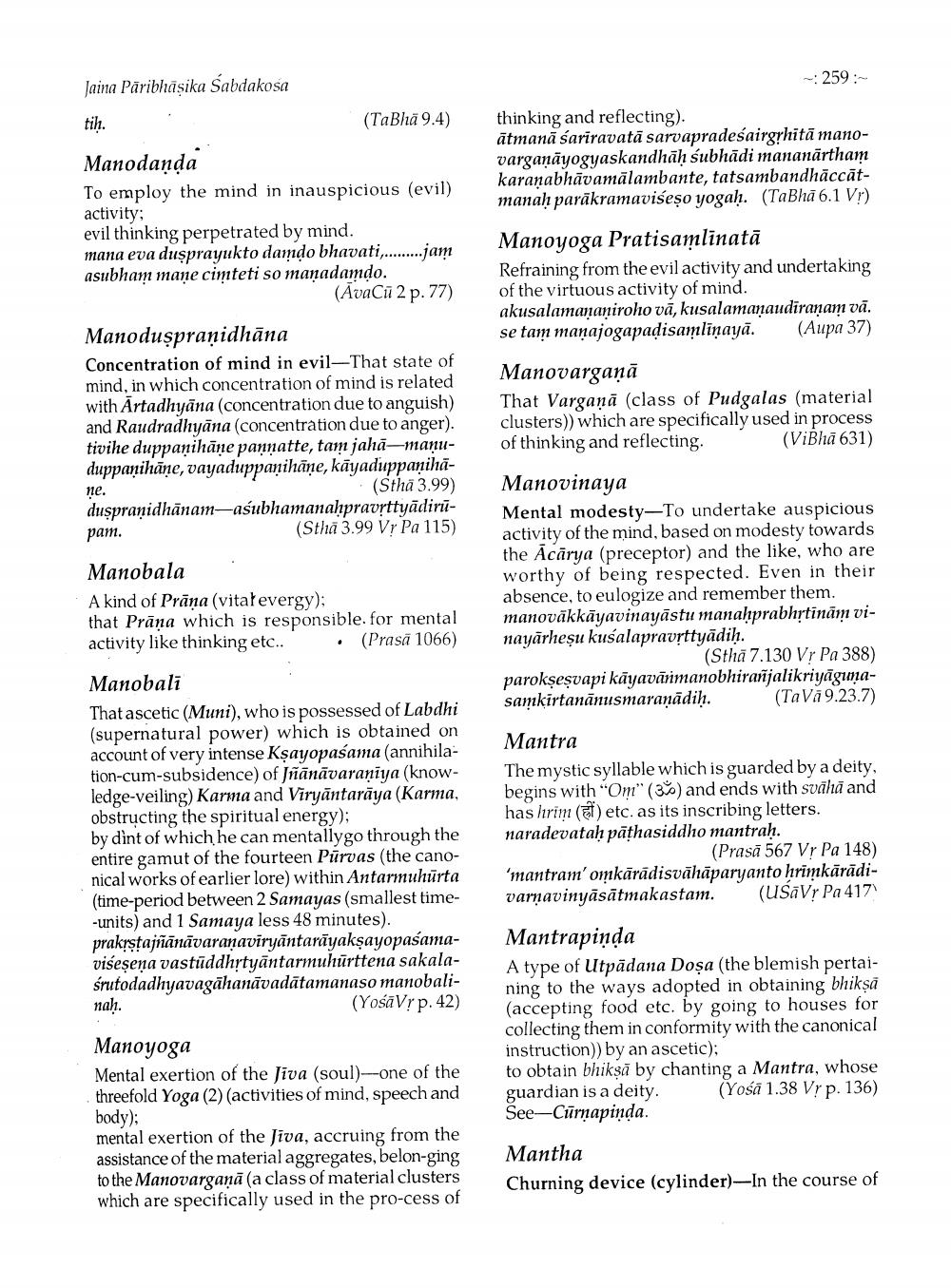________________
Jaina Pāribhāṣika Sabdakosa
259:
tih.
.
(TaBhā 9.4)
thinking and reflecting). ātmanā sariravatā sarvapradeśairgļhitā manovargaņāyogyaskandhāḥ śubhādi mananärtham karanabhāvamālambante, tatsambandhāccatmanah parākramavišeşo yogah. (Tabhā 6.1 Vr)
Manodanda To employ the mind in inauspicious (evil) activity; evil thinking perpetrated by mind. mana eva duşprayukto damdo bhavati..........jam asubham mane cimteti so manadamdo.
(AvaCū2 p.77)
Manoyoga Pratisamlinatā Refraining from the evil activity and undertaking of the virtuous activity of mind. akusalamananiroho vā, kusalamaņaudiranam vā. se tam manajogapadisamlīņayā. (Aupa 37)
Manoduspranidhāna Concentration of mind in evil-That state of mind, in which concentration of mind is related with Ārtadhyāna (concentration due to anguish) and Raudradhyāna (concentration due to anger). tivihe duppaņihāne pannatte, tam jahā-manuduppanihāņe, vayaduppanihāne, kāyaduppaņihane.
(Stha 3.99) duşpranidhānam-aśubhamanahpravrttyādirupam.
(Stha 3.99 Vr Pa 115)
Manovargaņā That Vargaņā (class of Pudgalas (material clusters)) which are specifically used in process of thinking and reflecting.
(ViBhā 631)
Manobala A kind of Prāna (vitałevergy); that Prāņa which is responsible for mental activity like thinking etc.. . (Prasā 1066)
Manovinaya Mental modesty-To undertake auspicious activity of the mind, based on modesty towards the Acārya (preceptor) and the like, who are worthy of being respected. Even in their absence, to eulogize and remember them. manovākkāyavinayāstu manahprabhịtinām vinayārheșu kusalapravrttyādih.
(Sthā 7.130 Vr Pa 388) parokşeşvapi kāyavārmanobhirañjalikriyāgunasamkirtanānusmaraņādih. (Tavā 9.23.7)
Manobali That ascetic (Muni), who is possessed of Labdhi (supernatural power) which is obtained on account of very intense Kşayopasama (annihilation-cum-subsidence) of Jñānāvaraniya (knowledge-veiling) Karma and Viryāntarāya (Karma, obstructing the spiritual energy); by dint of which he can mentally go through the entire gamut of the fourteen Purvas (the canonical works of earlier lore) within Antarmuhurta (time period between 2 Samayas (smallest time-units) and 1 Samaya less 48 minutes). prakrstajñānāvaranaviryāntarāyakşayopasamaviseşeņa vastüddhrtyāntarmuhürttena sakalaśrutodadhyavagāhanāvadātamanaso manobalinah.
(YośãVr p. 42)
Mantra
The mystic syllable which is guarded by a deity, begins with "Om" (3%) and ends with svāhā and has hrim (El) etc. as its inscribing letters. naradevatah pathasiddho mantra).
(Prasā 567 Vr Pa 148) 'mantram' omkārādisvāhāparyanto hrimkärādivarnavinyāsātmakastam. (uśãV? Pa 417
Mantrapiņda A type of Utpādana Dosa (the blemish pertaining to the ways adopted in obtaining bhikṣā (accepting food etc. by going to houses for collecting them in conformity with the canonical instruction)) by an ascetic); to obtain bhiksā by chanting a Mantra, whose guardian is a deity. (Yośā 1.38 Vr p. 136) See-Cūrnapinda.
Manoyoga Mental exertion of the Jiva (soul)--one of the threefold Yoga (2) (activities of mind, speech and body); mental exertion of the Jiva, accruing from the assistance of the material aggregates, belon-ging to the Manovargaņā (a class of material clusters which are specifically used in the pro-cess of
Mantha Churning device (cylinder)-In the course of




